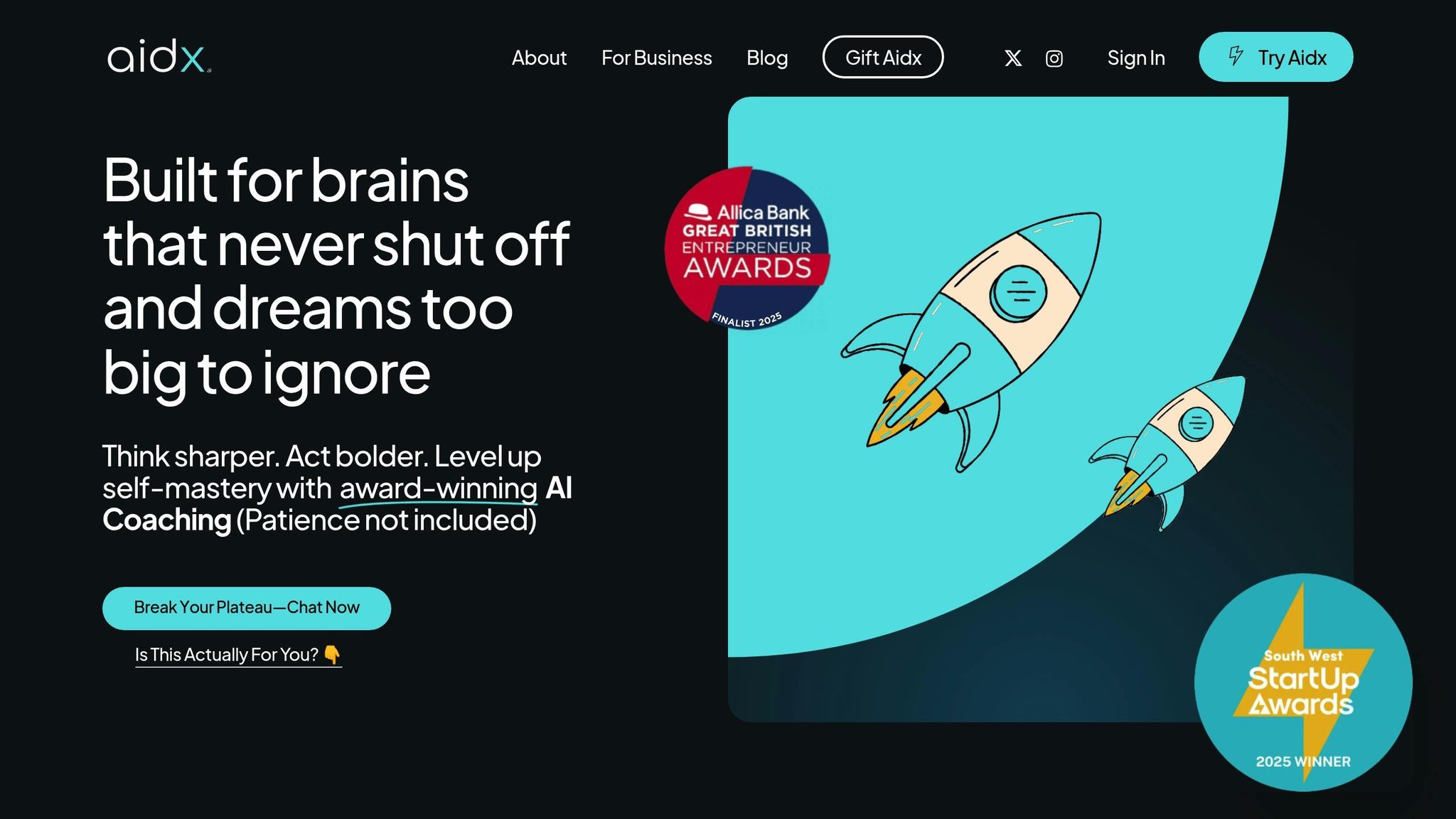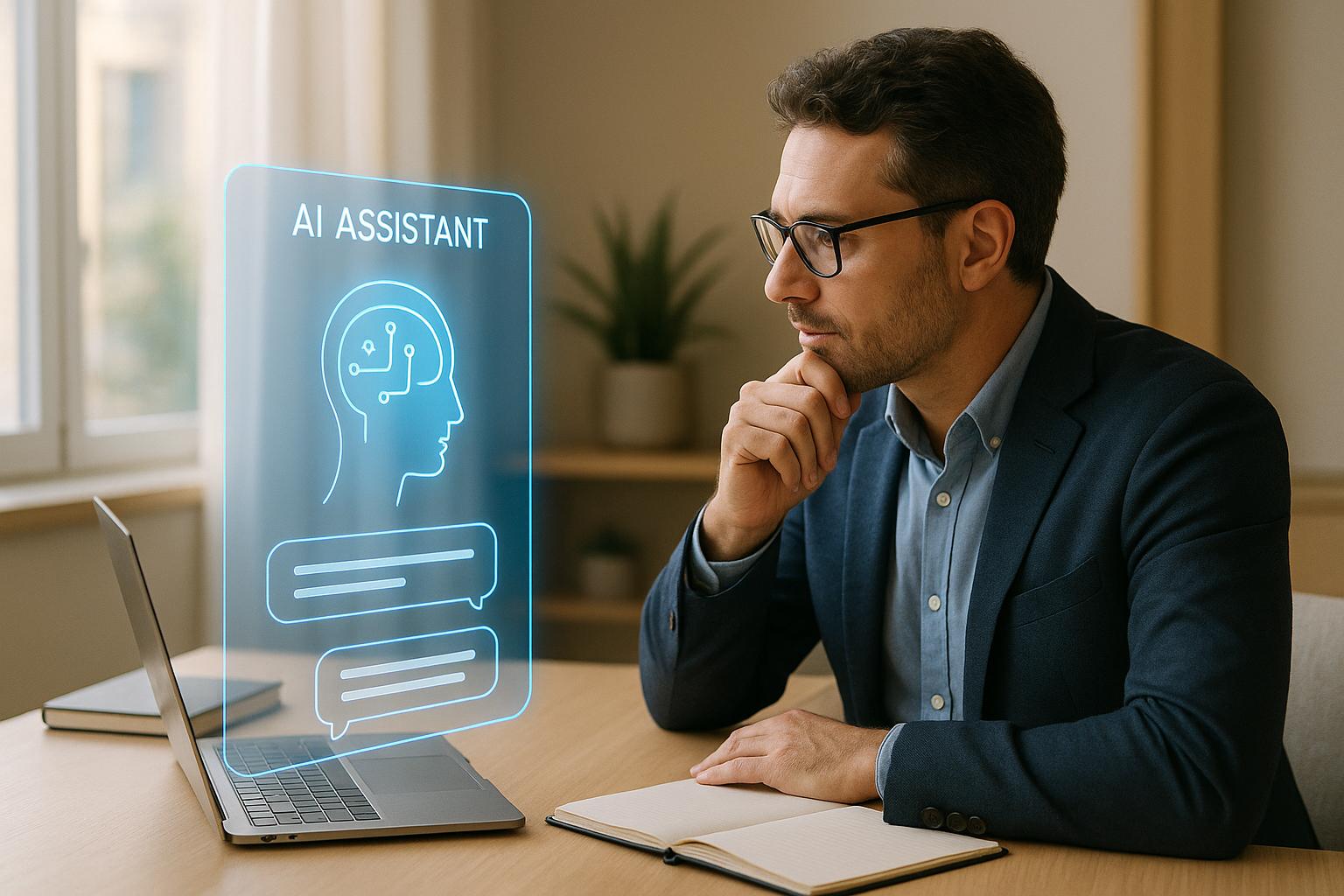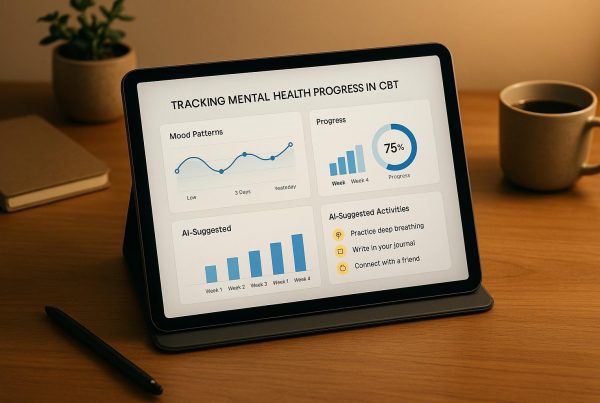AI coaching is changing how people develop mental flexibility, offering personalized, evidence-backed guidance that fits into your schedule. Whether you’re navigating career shifts, managing stress, or improving decision-making, AI tools like Aidx.ai provide real-time feedback and strategies tailored to your needs. By combining methods like CBT and ACT with advanced tech, these platforms help individuals and teams tackle challenges effectively.
Key Takeaways:
- What It Does: AI coaching analyzes your behavior and thinking patterns to deliver customized advice and exercises.
- How It Works: Uses psychological techniques (e.g., CBT, ACT) to help you reframe negative thoughts, manage stress, and build mental flexibility.
- Who Benefits: Professionals, students, and organizations seeking to improve problem-solving, resilience, and adaptability in dynamic settings.
- Features: Real-time feedback, progress tracking, and voice-enabled tools for 24/7 accessibility.
- Privacy & Cost: Platforms like Aidx.ai emphasize security, offering plans starting at $20/month.
AI coaching isn’t just for individuals – it supports teams and organizations too, improving collaboration and innovation. With tools like Aidx.ai, you’re equipped to handle uncertainty and thrive in a fast-changing world.
How AI Coaching Improves Adaptive Thinking Skills
What Is Adaptive Thinking and Why It Matters
Adaptive thinking is your ability to adjust thoughts, strategies, and behaviors when faced with new information, changing environments, or unexpected challenges. Think of it as mental flexibility – a skill that helps you handle uncertainty and complexity with ease. In today’s fast-paced world, this ability is more important than ever. It allows leaders and teams to shift strategies, embrace new ideas, and stay resilient during times of change. Studies link adaptive thinking to higher engagement, improved collaboration, and long-term competitive success[1][3]. Whether you’re navigating a career shift, leading through organizational changes, or tackling everyday problems, this skill forms a foundation for success.
The real-world value of adaptive thinking is clear. It helps you turn setbacks into opportunities to learn, explore multiple solutions to complex problems, and stay composed under pressure. This skill also sets the stage for AI-driven methods that refine and enhance your ability to adapt.
AI Methods for Building Mental Flexibility
AI coaching leverages established therapeutic techniques, such as CBT (Cognitive Behavioral Therapy), ACT (Acceptance and Commitment Therapy), DBT (Dialectical Behavior Therapy), and NLP (Neuro-Linguistic Programming), to strengthen mental flexibility. By analyzing your behavior patterns, AI tools identify areas where your thinking may be stuck and provide tailored interventions. These interventions often include exercises, reflective prompts, and clear goal-setting strategies. For example, if you’re dealing with a challenging situation, the AI might guide you through a CBT exercise to reframe negative thoughts or use ACT techniques to help you embrace uncertainty while staying focused on your values. These methods directly enhance your ability to adapt and solve real-world challenges.
Aidx.ai’s ATI System™ takes this a step further by learning your communication style and emotional patterns to deliver personalized interventions. The platform keeps you engaged through gamified experiences and multimedia tools, offering virtual scenarios that mimic real-life challenges. Practicing adaptive responses in these controlled settings accelerates skill development, as you actively engage in the learning process.
Personalized Feedback and Progress Tracking
One of the standout features of AI coaching is its ability to provide tailored support based on your unique patterns. By analyzing data on your preferences, emotional states, and progress, AI systems continuously refine their coaching strategies to suit your needs[2].
Real-time feedback is another key advantage. As you work on new thinking patterns, the AI provides instant reinforcement and actionable insights, helping you solidify adaptive habits more quickly[2][3]. This immediate guidance strengthens the strategies introduced earlier, making them more effective over time.
Progress tracking adds another layer of value by measuring improvements in areas like confidence, stress management, and problem-solving. Tools like Aidx.ai’s integrated planning and tracking features help you monitor measurable gains and adjust your approach as needed[2]. This evolving, data-driven process ensures that your coaching experience grows with you, fine-tuning its methods to align with your learning style and personality.
The impact of this personalized approach is backed by industry data. AI-driven adaptive learning systems have been shown to increase student engagement and retention by tailoring content to individual interests and abilities[2]. Similarly, organizations using AI coaching report faster innovation and better decision-making among top performers, with some even seeing measurable improvements in efficiency and revenue growth[1]. This level of customization is what drives meaningful progress in developing adaptive thinking skills.
I Tried AI as a Life Coach for 365 Days – Here’s What I Learned
Who Can Use AI Coaching for Adaptive Thinking
AI coaching isn’t just for a select few – it’s a tool that caters to a broad range of individuals and groups, each with unique needs and challenges. From personal career growth to large-scale organizational change, this technology adjusts to different contexts, providing tailored support. Let’s dive into who stands to gain the most from AI coaching.
Professionals and High Achievers
Executive leaders and managers often operate in high-pressure environments where strategic decisions, team management, and market shifts are part of daily life. AI coaching helps these professionals refine decision-making processes, manage stress, and stay resilient when dealing with unexpected challenges.
Entrepreneurs and business owners face constant demands to adapt quickly, whether it’s pivoting strategies or responding to market feedback. AI coaching offers around-the-clock support, making it an invaluable resource during late-night brainstorming sessions or early-morning emergencies.
Sales professionals and consultants benefit from tools that enhance situational awareness and adaptability. These roles require quick shifts in strategy based on client interactions. Aidx.ai’s Business Mode provides tailored coaching for workplace challenges, helping professionals refine their approaches and bounce back from setbacks.
Healthcare workers, lawyers, and other high-stress professionals turn to AI coaching to maintain clarity and build resilience. These careers often involve life-altering decisions and significant responsibilities, making adaptive thinking a critical skill for both professional success and personal well-being. The voice-enabled interface allows busy professionals to engage with coaching during commutes or between appointments, fitting seamlessly into packed schedules.
Students and Lifelong Learners
College and graduate students rely on AI coaching to sharpen critical thinking, manage stress, and navigate transitions. Moving from structured learning environments to more independent decision-making can be daunting, but AI coaching helps students tackle challenges, develop problem-solving skills, and build confidence.
Adult learners returning to education face unique hurdles, such as balancing family responsibilities or overcoming self-doubt after years away from school. AI coaching provides the guidance and encouragement needed to adapt to these new learning environments.
Professionals pursuing certifications or new skills find AI coaching particularly useful for staying motivated and adjusting study strategies. Personalized feedback ensures learners can identify ineffective approaches and switch to methods that work better for them.
Creative professionals and artists use AI coaching to push past creative blocks, adapt to industry shifts, and build resilience in the face of rejection or criticism. With constant changes in technology and audience preferences, adaptability is key in creative fields.
Aidx.ai’s Life Mode focuses on personal growth and mental wellness, helping students and lifelong learners set goals, track progress, and stay motivated. Integrated planning tools make it easier to manage educational and personal development milestones.
Organizations and Teams
AI coaching extends beyond individuals, offering organizations a way to build collective resilience and adaptability. Many companies are integrating AI coaching into their HR and wellness programs to enhance employee performance and mental health. Employees with strong adaptive thinking skills are better equipped to handle change, collaborate effectively, and drive innovation.
Healthcare systems and hospitals use AI coaching to support staff well-being and prevent burnout. With 24/7 availability, healthcare workers can access coaching during night shifts or between patient care duties, helping them manage stress in real time.
Technology companies and startups thrive on rapid growth and frequent change. AI coaching helps teams adjust to shifting priorities, learn from failures, and maintain productivity during uncertain times.
Educational institutions and school districts implement AI coaching to support both teachers and students. Educators benefit from guidance on classroom management, curriculum adjustments, and stress relief, while students develop critical life skills and emotional resilience.
Aidx.ai’s Corporate solution provides valuable insights and tools for organizations. Features like aggregated metrics allow companies to monitor employee satisfaction, burnout risk, and work-life balance while respecting individual privacy. The Practitioner Dashboard enables internal coaches and counselors to focus on strategic moments, leaving routine sessions to AI.
This data-driven approach helps organizations pinpoint areas needing extra support and measure the impact of wellness initiatives. Some companies have reported better employee retention, fewer sick days, and overall performance improvements after adopting AI coaching.
Remote and hybrid teams also benefit significantly. With team members spread across time zones and locations, AI coaching ensures consistent support is available, helping maintain team cohesion and individual productivity no matter where employees are based.
What to Expect from AI Coaching
Starting with AI coaching is straightforward and designed to be supportive. Knowing what to expect from your first interaction through ongoing sessions can help you set realistic expectations and make the most of the experience.
Getting Started and Initial Assessment
Your AI coaching journey kicks off with a detailed assessment that goes far beyond basic questionnaires. Platforms like Aidx.ai use advanced onboarding methods to understand not only your goals but also how you naturally communicate and process information.
The Adaptive Therapeutic Intelligence (ATI) System™ begins learning about you right from the first interaction. Instead of fitting you into rigid categories, it observes your communication style, emotional reactions, and preferred learning methods. It asks follow-up questions and experiments with different coaching techniques to figure out which evidence-based strategies are most effective for you. Whether you respond better to direct challenges, gentle encouragement, or detailed analysis, the system adjusts accordingly.
For example, some users may thrive with Cognitive Behavioral Therapy (CBT) techniques, while others benefit more from approaches like Acceptance and Commitment Therapy (ACT) or Neuro-Linguistic Programming (NLP).
This assessment phase unfolds over several conversations rather than a single session. This gradual approach ensures the AI gathers authentic insights into your thought patterns, stress responses, and goal-setting style without overwhelming you with forms or intrusive questions.
Once the assessment is complete, the platform uses these insights to deliver actionable tools and strategies.
Main Features and Tools
AI coaching platforms offer a variety of tools designed to turn insights into measurable progress:
- Voice-enabled support allows you to engage with the platform anytime, whether you’re commuting or taking a quick break. The natural speech recognition system adapts to different accents and speaking styles, making conversations feel smooth and intuitive.
- Integrated planning tools help translate advice into specific, time-bound goals. Instead of vague suggestions, the AI works with you to create actionable plans, complete with reminders and accountability features like push notifications and email alerts.
- Self-monitoring features let you track your emotional states, confidence levels, stress patterns, and performance metrics over time. This data becomes especially valuable during tough periods, as it provides tangible proof of your resilience and growth, even when progress feels slow.
The platform also tailors its modes to suit various needs, whether you’re focused on personal growth, professional development, or achieving peak performance.
- Progress tracking goes beyond simple stats. The AI identifies patterns in your behavior, recognizes when you’re successfully applying learned techniques, and adjusts future sessions to align with your development. This makes the experience truly personalized and dynamic.
- Multi-platform access ensures a seamless experience across devices. Whether you prefer desktop interactions during focused work hours or mobile sessions on the go, everything stays synced. Thanks to Progressive Web App (PWA) technology, you get app-like functionality without taking up much storage on your device.
Together, these tools create a cohesive system that supports your growth while adapting to your evolving needs.
Privacy, Security, and Access
AI coaching platforms prioritize not just personalization but also security and accessibility, giving you peace of mind as you work through challenges.
Privacy is a top priority. Aidx.ai is GDPR compliant, with full encryption and no human oversight unless legally required. This ensures that your conversations remain private – even from the platform’s staff – fostering a safe space for honest reflection.
For added discretion, Incognito mode allows you to discuss sensitive topics without leaving a trace. Conversations in this mode automatically delete after 30 minutes of inactivity, providing an extra layer of confidentiality.
24/7 availability eliminates the need for scheduling. Whether it’s a 3 AM anxiety spike, a tough decision during a business trip, or a confidence dip before a big presentation, support is always just a click away. This real-time access is especially useful during moments of crisis when waiting for a scheduled session isn’t an option.
On the security front, robust measures go beyond basic encryption to protect your data from breaches or unauthorized access. Your personal information, conversation history, and progress data remain secure while still allowing the platform to adapt to your needs.
Flexible access options make it easy to get started. You can try out the platform with anonymous demo access or sign up for the free Starter Plan, which includes 30 conversation turns to explore its features. For $20 per month, the Elevate Plan provides unlimited access to all modes and tools, backed by a 30-day money-back guarantee.
This combination of advanced technology, privacy protections, and accessibility creates a safe and supportive environment. It encourages you to explore tough topics, acknowledge vulnerabilities, and tackle challenges without fear of judgment. This sense of psychological safety is key to developing meaningful, adaptive skills rather than just surface-level coping mechanisms.
sbb-itb-d5e73b4
Pros and Cons of AI-Powered Adaptive Thinking Tools
AI coaching has emerged as a powerful tool for enhancing adaptive thinking, offering a mix of benefits and challenges. Here’s a closer look to help you decide if it’s the right fit for your needs.
Benefits of AI Coaching
AI coaching brings several advantages to the table:
- Personalized support at scale: Platforms like Aidx.ai use their Adaptive Therapeutic Intelligence (ATI) System™ to tailor coaching to your unique communication style, emotional tendencies, and preferences. Whether you respond better to direct feedback, gentle encouragement, or an analytical approach, the system adapts to meet your needs.
- 24/7 availability: AI tools are accessible anytime, removing the scheduling obstacles that often prevent people from seeking help when they need it most.
- Affordable access to professional techniques: AI coaching makes evidence-based methods like Cognitive Behavioral Therapy (CBT), Acceptance and Commitment Therapy (ACT), and Neuro-Linguistic Programming (NLP) accessible at a fraction of the cost of traditional coaching.
- Consistent and objective support: Unlike human coaches who may have off days or personal biases, AI applies evidence-based practices reliably, offering objective feedback rooted in therapeutic principles.
- Privacy and stigma-free reflection: Many platforms prioritize privacy, creating a safe space for honest self-reflection without fear of judgment.
- Scalability for teams: Companies can use AI coaching to support entire teams simultaneously. Aggregated metrics, like job satisfaction and burnout risk, give leaders actionable insights while maintaining individual privacy.
While these benefits are compelling, there are challenges worth considering.
Common Challenges and How to Address Them
AI coaching isn’t without its hurdles. Here’s a breakdown of common challenges and practical ways to overcome them:
- Resistance to technology: Some users prefer face-to-face interactions or worry that AI lacks the empathy needed for meaningful coaching. To ease into it, try platforms offering anonymous demo access or free trials. This allows you to experience the technology without pressure. Think of AI coaching as a complement to human connections, not a replacement.
- Digital literacy barriers: Navigating advanced features like voice interfaces or tracking progress can be tricky, especially for older adults or those less familiar with technology. Look for platforms with intuitive, voice-first designs and multiple access options, such as mobile apps or web versions. Many tools also use Progressive Web App (PWA) technology, which simplifies functionality without requiring downloads.
- Privacy and data security concerns: Discussing sensitive topics like mental health or workplace issues can raise worries about how your data is stored and used. To address this, research the platform’s security credentials. Reputable platforms offer full encryption, adhere to GDPR compliance, and operate with no human oversight unless legally mandated. Features like incognito mode can add an extra layer of privacy.
- Over-reliance on AI: There’s a risk of becoming too dependent on AI, potentially neglecting relationships with family, friends, or therapists. To avoid this, use AI coaching as one of many tools in your personal development. Set boundaries around usage and maintain regular human connections. AI can be a helpful bridge to professional support but shouldn’t replace it entirely.
- Limited emotional nuance: AI struggles with complex emotional situations requiring deep empathy or cultural understanding. While it excels in structured, evidence-based techniques, it can’t fully replicate the insight of an experienced human coach. Use AI for routine support and skill-building, but seek human professionals for trauma, severe mental health concerns, or complicated relationship issues.
- Technical glitches and connectivity issues: Problems like poor voice recognition or internet disruptions can interfere with sessions, especially during critical moments. Familiarize yourself with both voice and text interfaces, and ensure a stable connection. Many platforms offer multi-platform access, so you can switch devices if needed.
The Future of AI Coaching for Adaptive Thinking
AI coaching is rapidly transforming, driven by advancements that make it more accessible, responsive, and effective. These developments are paving the way for tools that help users strengthen their mental flexibility and resilience like never before.
New Technologies in AI Coaching
One of the biggest drivers of change in AI coaching is the progress in natural language processing. Modern AI systems are becoming more conversational and emotionally aware, allowing them to detect subtle cues in tone and expression. This evolution is making AI coaches better equipped to provide personalized and responsive support, which is essential for developing adaptive thinking. These advancements are reshaping not just how mental health support is delivered but also how it’s tailored to individual needs.
How Aidx.ai Is Shaping the Future

Aidx.ai stands out as a leader in next-generation AI coaching. Recognized as a two-time winner of the UK Startup Awards in 2024 and 2025, the platform is redefining personalized mental health support. At the core of its innovation is the Adaptive Therapeutic Intelligence (ATI) System™, which adjusts to each user’s unique communication style and emotional patterns, delivering support that feels increasingly tailored and effective.
Aidx.ai’s voice-first design tackles one of the most common barriers to mental health care: convenience. By enabling users to access support anytime, even while on the move, the platform ensures help is always within reach.
The platform also takes a layered approach to accessibility, offering flexible plans that incorporate evidence-based methods like Cognitive Behavioral Therapy (CBT), Acceptance and Commitment Therapy (ACT), and Neuro-Linguistic Programming (NLP). This makes these proven techniques available to a wider audience than traditional therapy typically allows.
To meet diverse user needs, Aidx.ai offers specialized modes – Life, Business, and Performance – ensuring tailored support for various aspects of personal and professional growth. Additionally, the platform prioritizes privacy with advanced safeguards designed to protect sensitive mental health data without compromising the quality of care.
Aidx.ai also supports mental health practitioners through hybrid care models. By handling routine tasks and providing real-time client metrics, the platform allows therapists to focus on more complex cases, creating a scalable solution for addressing the increasing demand for mental health services.
With over three decades of combined expertise in coaching, therapy, AI engineering, and cybersecurity, Aidx.ai’s founders are uniquely qualified to push the boundaries of what AI-powered adaptive thinking tools can achieve. Their dedication to evidence-based practices ensures that cutting-edge technology is firmly anchored in proven therapeutic methods.
As AI coaching continues to evolve, platforms like Aidx.ai are proving to be invaluable partners in mental health care. They make adaptive thinking tools more accessible, affordable, and seamlessly integrated into everyday life, complementing traditional approaches and meeting the growing need for mental health support.
Conclusion
AI coaching is reshaping how we approach personal and professional growth. By analyzing individual communication styles, emotional tendencies, and learning preferences, it offers tailored, real-time feedback that’s accessible 24/7. Whether you’re a professional, a student, or part of an organization, this technology adjusts to your unique needs and schedule, delivering tangible improvements in performance.
The results speak for themselves. Companies are seeing revenue gains through increased efficiency, even as traditional change initiatives often fall short[1]. This underscores the growing importance of adaptive thinking in a world that’s constantly evolving.
Take Aidx.ai, for example. This platform, recognized at the UK Startup Awards in both 2024 and 2025, combines therapeutic intelligence with actionable planning. It uses evidence-based approaches and proprietary adaptive systems to deliver impactful results.
Looking ahead, the integration of AI coaching with technologies like virtual and augmented reality promises even more immersive and effective learning experiences. For those ready to explore this path, the key lies in choosing platforms that prioritize privacy, rely on proven methods, and deliver true personalization. AI coaching isn’t just a tool – it’s a way to build the mental flexibility needed to turn challenges into opportunities. Starting now means setting the stage for growth, resilience, and success in an ever-changing world.
FAQs
What makes AI coaching different from traditional methods for building adaptive thinking skills?
AI coaching takes a different route compared to traditional methods by delivering a deeply personalized and data-driven way to build flexible thinking skills. While traditional coaching often leans on one-size-fits-all techniques, AI tools learn from you – your communication style, emotional tendencies, and preferences. This means the guidance you get is specifically tailored to your needs, with real-time feedback that evolves as you do.
Another big advantage? AI coaching is available anytime, day or night. This round-the-clock accessibility lets you practice adaptive thinking in real-world situations as they happen. Instead of waiting for the next scheduled session, you get consistent support whenever you need it, making it an effective way to strengthen your ability to adapt and bounce back.
How does Aidx.ai protect my privacy and keep my data secure?
Aidx.ai takes your privacy seriously by using full encryption for both storing and transferring data. This means your information stays secure at every stage.
What’s more, your data remains completely private – no human will ever access or review it. Built with a strong focus on privacy and security, Aidx.ai ensures your personal information is always shielded.
How can companies successfully integrate AI coaching into their HR and wellness programs to boost employee performance?
Companies can weave AI coaching into their HR and wellness programs by leveraging tools designed to offer personalized support in areas like stress management, career development, and productivity. These tools are built to adjust to individual employee needs, delivering guidance that aligns with both their personal aspirations and professional objectives.
For a smooth rollout, AI coaching platforms should work effortlessly with existing HR systems, ensuring data remains consistent while improving operational workflows. With real-time insights and proactive suggestions, these tools can encourage a workplace culture focused on wellness and ongoing growth. The result? Enhanced employee performance, greater job satisfaction, and stronger retention rates.



